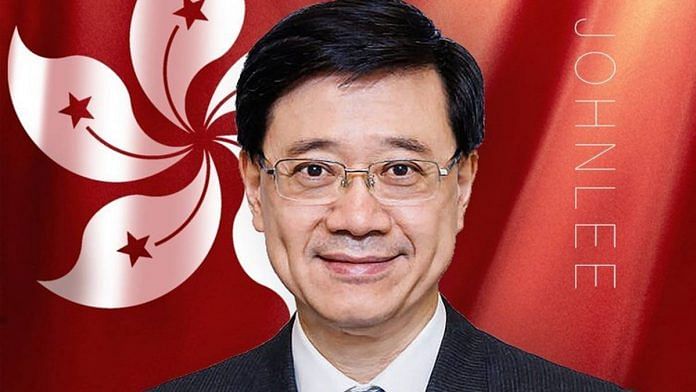
New Delhi: Hong Kong’s controversial former security chief, John Lee Ka-chiu, was named the island city’s new leader following a closed voting process Sunday.
He will begin his five-year term as chief executive starting 1 July.
Lee, 64, who replaces outgoing leader Carrie Lam, served as Secretary for Security in 2019 when there were violent crackdowns on pro-democracy protests sparked by a controversial bill to allow extraditions to mainland China. He reportedly permitted police to use tear gas, rubber bullets, water cannons and at times live ammunition on protesters.
In August 2020, Lee was one of 11 individuals, including Carrie Lam, who were economically sanctioned by the US for “undermining Hong Kong’s autonomy” and “restricting the freedom of expression or assembly of the citizens of Hong Kong”. This came two months after Hong Kong passed a security law that reduced the city’s judicial autonomy and criminalised most forms of protest and activism.
Washington had accused Lee of using the security law to “coerce, arrest, detain and imprison” individuals and for creating a special police unit for implementing the security law.
Lee, the sole candidate in the race to be Hong Kong’s next chief executive, was picked by a small committee of Beijing loyalists through secret ballot. He won 1,416 votes or roughly 99 per cent of the votes.
Lee will assume the post of chief executive at a time when Hong Kong is starting to bounce back from a major surge of Omicron infections earlier this year, and simmering social unrest over the extradition bill and national security law. Lee was instrumental in pushing the bill ahead. He was even accused of calling the protests an act of “terrorism” and “violence”.
Also read: Hong Kong is arresting citizens under new security law over online comments, activity
Who is John Lee?
Lee was born into a working-class family in Hong Kong’s Guangzhou in December 1957. Not much is known about his parents or family and private life, so much so that even some of his closest friends are not aware of them.
He attended Wah Yan College in Kowloon. A former mathematics teacher Norman So Chung-ping told South China Morning Post that Lee was a “very obedient” student and was among the few who scored an A for Applied Mathematics in a national-level exam.
In 1977, he joined the Hong Kong police force as a probationary inspector and held many posts over his three-decade career.
At one point, he was in charge of the Criminal Intelligence Bureau, West Kowloon Regional Crime Unit, the Narcotics Bureau and the Organized Crime and Triad Bureau, according to a report by Hong Kong media outlet The Standard.
He eventually worked his way up to become a deputy commissioner of police.
In 2012, Lee left the police force and joined the Hong Kong government as Under Secretary for Security. Five years later, he was appointed as security chief and became the second highest ranking official in Hong Kong.
On 6 April this year, Lee resigned from his position as security chief and announced plans to enter the race to become the city’s next chief executive. It came two days after then Chief Executive Carrie Lam announced she would not be running for a second term.
Stance on extradition bill, security law
During his stint as security chief, Lee had to deal with a myriad of issues from protests over the extradition bill and security law, to an unprecedented surge of Covid-19 infections earlier this year. On most issues, he has taken a pro-Beijing stance.
He was instrumental in passing the controversial extradition bill, despite the backlash. “I respect opinions from everyone, but it is a fact that I cannot deal with the Taiwan murder case because there is no law,” he said in April 2019, referring to the 2018 murder case in which pregnant Hong Kong woman Poon Hiu-wing was killed in Taipei.
“The second fact is, the [existing system] is full of matters that make it not practicable, so to me it is a loophole that we must plug,” he added.
During his election campaign this year, however, he changed his tune. He said there is no need to revisit the extradition bill, which was never fully initiated in Hong Kong.
Lee was also instrumental in implementing the 2020 security law. Months after being sanctioned by the US, Lee remained committed to enforcing the legislation. He said in January 2021: “I would like to express my gratitude to President Xi. We will be more steadfast in safeguarding national security in our work”.
Ban on Hong Kong National Party
It was also under Lee’s watch that the Hong Kong National Party, the first outfit to support independence for Hong Kong ever since Britain handed it to the Chinese in 1997, was banned in 2018. He had accused the party of spreading “hatred and discrimination against mainland Chinese” at the time.
Experts have said the former police commissioner’s ascension to the post of chief executive is in line with China’s tightening grip on Hong Kong.
“It conforms with the trend of securitisation in mainland China in the past 10 years, especially after Xi Jinping came to power,” Sonny Lo, a political analyst based in Hong Kong, told The New York Times Friday.
(Edited by Nida Fatima Siddiqui)
Also read: Hong Kong is arresting citizens under new security law over online comments, activity

COMMENTS